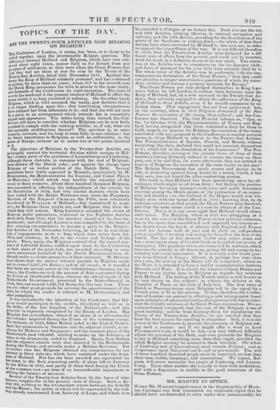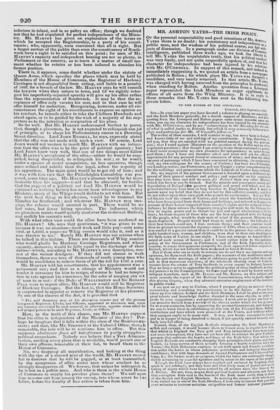MR. HARVEY IN OFFICE.
WHEN Mr. HARVEY'S appointment to the Registrarship of Hack- ney Carriages was first announced, we expressed regret that he should have condescended to serve under men immeasurably hale inferiors in talent, and in so paltry an office; though we doubted not that he had stipulated for perfect independence of the Minis- try. Mr. HARVEY has given an explanation of the terms on which he accepted the Registrarship, to a party of his consti- tuents; who, apparently, were convinced that all is right. But a larger section of the public than even the constituency of South- wark have a right to be satisfied on this point; for men of Mr. HARVEY s capacity and independent bearing are not so plenty, in Parliament or the country, as to leave it a matter of small mo- ment whether he retains or has been induced to abandon his former position. There is, it appears, some doubt whether under the statute of Queen Anne, which specifies the places which may be held by Members of the House of Commons, the Registrar of Hackney Carriages is not disqualified from sitting, and liable to a penalty of 500/. for a breach of the law. Mr. HARVEY says he will consult the lawyers when they return to town, and (if we rightly inter- pret his imperfectly-reported speech) will give up his office rather than the representation of Southwark. It may be that the ac- ceptance of office only vacates his seat, and in that case he will offer himself for reelection. Recognizing, however, under all cir- cumstances the right of his constituents to express an opinion on his conduct, be intends either to take the Chiltern Hundreds and stand again, or to be guided by the wish of a majority of his sup- porters as to the retention or resignation of his place. So far well. But Mr. HARVEY endeavoured further to prove, that, though a placeman, he is not expected to relinquish one jot of principle, or to shape his Parliamentary course in a Downing Street direction. Lord JOHN RUSSELL, he says, expressly stated that the offer was not made with such a view. Of course, Lord JOHN would not venture to insult Mr. HARVEY with an intima- tion that the office was to be the price of political apostacy ; but Lord Jonis knew very well, that one of two things must follow Mr. HanvEv's acceptance of the offer,—either he would be com- pelled, being disqualified, to relinquish his scat ; or be would, under a species of moral compulsion, no less operative, though more refined and subtile than the legal, soften the asperity of his opposition. The main point would be to get rid of him; and it was with this view that the Philadelphia Consulship was pro- posed, some time ago. Mr. HARVEY'S absence would be far more desirable than his support—could that be obtained; for besides that the support of a political nit (and Mr. ILvavsy would be esteemed as nothing better) has never been advantageous to any Ministry, many of the Whigs would dislike to act with him. But the next best thing to his absence, would be to trammel the Member for Southwark; and whatever Mr. HARVEY may ima- gine, the scheme would succeed in part. There would be no bad votes, but fewer biting speeches. The influence which tio placeman resists would quietly steal over the ci-devant Radical, and mollify his sarcastic soul. With what other view could the office have been conferred on Mr. HARVEY? Oh, says that gentleman, "it was given to me
because it was no sinecure—hard work and little pay—only some 500/. or 1,000/. a year—no Whig cousin would take it, and so it was thrown to me." Surely Mr. IlaavsY was not serious when be talked in this fashion. There arc thousands of Whig cousins
who would gladly be Hackney Carriage Registrars, and whose capacity, moreover, would be fully equal to the discharge of their duties—which, according to Mr. HARVEY'S own description, con-
sist of the veriest drudgery. If they did not choose to work themselves, there are tens of thousands of needy young men who would be candidates to relieve them of all the toil for 150/. a year.
Mr. lImivs.v told his constituents, that his appointment was a permanent one; and that as a change of Ministry would not
render it necessary for him to resign, of course lir had no tempta-
tion to vote against his conscience for the sake of keeping any set of men in or out: if the Duke of WELLINGTON and Sir ROBERT PEEL were to regain ollice, Mr. Ilaavsy would still be Registrar of Hackney Carriages. But the fact is, that the Home Secretary is empowered to appoint or remove the Registrar at his pleasure. By one of the clauses of the Act, it is provided that 4, The said Secrettly may at lilac discretion remove any of the persons being stic'n Registrar, Clerks, and Officers, appointed as aforesaid, and, upon any vacancy occasioned by such removal, or otherwise, appoint some other fit and proper person to be such Registrar, Clerk, or Officer." HOW, in the teeth of this clause, can Mr. HARVEY suppose that his office is independent of the Minister of the day ? Per- haps he imagines that it falls within the class of the Bumburoau- crats ; and that, like Mr. STEPHEN at the Colonial Office. though removable, the rule will be to continuo him in office. But this supposes abstinence from all interference in party si-ruggles- political Nobody Call believe that a Tory Adminis- tration, needing every place that is available, would permit one of their own officers, removable at their fiat, to beard them in the House of Commons. No, no; dropping all mystification, and looking at the thing with the eye of a shrewd man of the world, Mr. HARVEY cannot fail to discover that he will be gagged, or at least trammelled, by the acceptance of office under men whose conduct he so strongly disapproves of. We foresee, that unless he relinquish it, he is lost as a public man. And who is there in the whole House of Commons to supply his peculiar place there? We call upon him to come out from among the enemy, into whose snare he 1413 fallen, before the faculty of free action is taken from him.



























 Previous page
Previous page